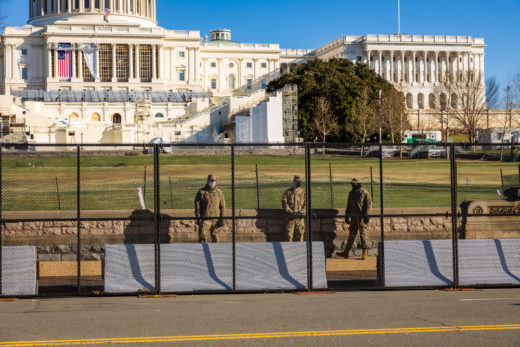 The hearings of the U.S. House Select Committee to Investigate the January 6th Attack on the United States Capitol have two fundamental and distinct tasks and responsibilities: first, to present a true account, based on conclusive evidence and logic; and second, to persuade the American public that this is indeed the only true and conclusive account. The first is epistemological, the second is rhetorical. Both are prerequisites to any appropriate and reliable legislative, judicial and political results that will adequately “preserve, protect and defend” the U.S. Constitution and American democracy.
The hearings of the U.S. House Select Committee to Investigate the January 6th Attack on the United States Capitol have two fundamental and distinct tasks and responsibilities: first, to present a true account, based on conclusive evidence and logic; and second, to persuade the American public that this is indeed the only true and conclusive account. The first is epistemological, the second is rhetorical. Both are prerequisites to any appropriate and reliable legislative, judicial and political results that will adequately “preserve, protect and defend” the U.S. Constitution and American democracy.
In the past year, NEJHE has addressed how these issues relate in principle to the missions of postsecondary education. Consider: Truth, Education and Democracy in an Era of “Alternative Facts” and Evidently True? and Moment of Truth.
With the televised public hearings of the Jan. 6 committee, we are now given a superb and broadly useful practical demonstration and teaching opportunity, illuminating our professional roles and responsibilities in the neglected field of civic education.
There is in this, however, a special pedagogical challenge: that the committee’s two tasks are problematically related in our nation today. As scholars, we have been trained to think and teach on the basis of evidence, but as Jonathan Rauch’s book, The Constitution of Knowledge: A Defense of Truth, shows and contends, the general public does not think about the world that way. Instead, people rely on trust—accepting what they are told by those whom they decide, usually on subjective grounds, to trust. Moreover, this common practice has contributed to the fragmentation and polarization of our body politic, now driven to extremes by internet social media, and intensely focused in the issues surrounding Jan. 6. Accordingly, the committee is further challenged—to combine their two tasks in a single coherent, mutually reinforcing, argument.
By focusing on the technical issues of epistemology and rhetoric—how to think most reliably about the objective world, and how most effectively to persuade others—we can avoid getting entangled in divisive arguments over the substantive issues of guilt/innocence or partisan politics. Our goal is not to drive our students to any foregone substantive conclusion, but rather to strengthen and refine their epistemological and rhetorical capabilities—to think more rigorously on the basis of evidence and to become more effectively persuasive in presenting their points of view to others.
Identifying and weighing evidence requires skill and practice—for example, with documents and other objective items and data, discerning various degrees of relevance to issues at hand. The reliability of personal testimony of witnesses in the hearings varies according to their authority, degrees of proximity (e.g., from participant to eyewitness to hearsay), relevance to an issue, strength of independent corroboration, etc.
Evaluating the persuasive power of rhetoric requires evidence in countless forms, as well as experience and expertise in the arts of persuasion, yielding insight into what works generally or in similar situations. Uses of diverse documentary and graphic media, emotional and aesthetic values, personal attractiveness and other subjective values all can play useful roles in argument. Sensitivity to the audience(s) to be persuaded is also necessary—their tastes, wants and needs, the constraints under which they are operating in response, their personal qualifications (e.g., education levels, professional capabilities and interests, technical abilities), all of which must be considered.
As a purely technical matter, combining epistemology and rhetoric in a single powerful argument is not only possible but necessary, according to rules of rhetoric laid down and practiced throughout its long history. In Classical times, revived in the Renaissance, rhetoric was one of the liberal arts or humanities (studia humanitatis, studies of humanity in the sense of humaneness). The original and most influential authority on the subject was Aristotle, whose 4th century B.C. practical manual On Rhetoric defined it as persuasion—effective speech and writing. The most persuasive argument, he contended, would combine ethos (the authority of the speaker), logos (the reasoning of the argument) and pathos (the feelings of the reader or listener).
It is remarkable that the Jan. 6 committee, having learned this from practical experience, structured its first two presentations on June 9th and 13th on all three elements, concluding the first with the highly emotional and compelling active eyewitness testimony of Caroline Edwards, the wounded heroic guard at the Capitol that day, and the second with showing how the “Big Lie” was used to raise millions of dollars from small donations, which were then misused.
Ronald Daniels’ excellent recent book, What Universities Owe Democracy, argues with urgency that higher education is now in a moment of truth, in which our fundamental liberties are at stake, and that we must step up to defend democracy itself. The Jan. 6 hearings and the committee’s forthcoming report provide for us an excellent handle on the issue, which we can effectively and appropriately use in teaching by focusing on the technical issues of epistemology and rhetoric, rather than getting entangled in the heated controversies of accountability.
George McCully is a historian, former professor and faculty dean at higher education institutions in the Northeast, professional philanthropist and founder and CEO of the Catalogue for Philanthropy.
[ssba]
